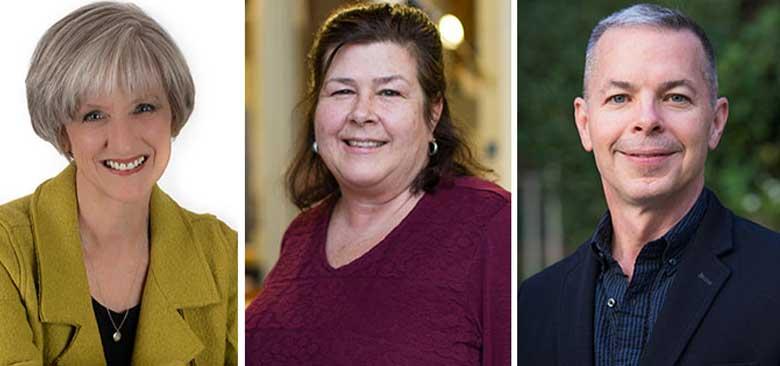
From left, Deborah Johnson, Carol Dawson-Rose and Matt Tierney have provided stellar leadership to their respective organizations, influencing important nursing issues.
Advocating for Nurses and Health Care, at the National and International Levels
Amid an ever-changing and increasingly complex health care landscape, nurses offer a unique perspective on health reform that advances health care for diverse communities.
Three UCSF School of Nursing faculty members are continuing a long tradition of faculty leaders who are steering impactful change on the national and international stage. As presidents of major professional nursing organizations, these faculty members are leading important initiatives — from influencing policy, to increasing diversity, to enhancing access to care — that will advance health care access for patients nationwide and across the globe.
Impacting Policy
As president of the International Society of Psychiatric-Mental Health Nurses (ISPN), a group of more than 400 international academic and clinical professionals, School of Nursing associate professor Deborah Johnson is leveraging the organization’s clout to influence policymakers.
She created the organization’s first policy committee, tasked with addressing laws and regulations impacting psychiatric mental health nurse practitioners.
“We had some powerhouse members who influenced on an individual level,” said Johnson, “but ISPN is in a position to do more together than a person can do individually.”
Ensuring full practice authority for advanced practice registered nurses (APRNs) is a top priority for Johnson and California’s recent passage of legislation expanding scope of practice for certified nurse-midwives and nurse practitioners is a positive sign. Enabling nurses to practice with greater authority helps fill a critical gap in the shortage of primary care providers, especially in rural areas, and provides patients more choices for care. More than 200 studies have shown the quality of care of nurse practitioners is similar to a physician, according to the American Association of Nurse Practitioners.
ISPN has continued to build upon a partnership with the Global Alliance for Behavioral Health and Social Justice, an organization that addresses issues from climate change to LGBTQ+ rights, and the groups are sharing resources to collaborate on common issues such as mental health care and well-being. ISPN has also been sponsored for membership with the Mental Health Liaison Group, a coalition of more than 60 national nursing organizations advancing federal policies on mental health and addiction.
Johnson began her term in April 2020 as the COVID-19 pandemic strengthened, threatening the organization’s financial state and putting its widely attended annual conference at risk. She guided the organization’s transition to a virtual conference, bringing in much-needed funding to stabilize the group financially. She also supported the creation of ISPN’s peer support group for nursing professionals who are struggling during the pandemic. The support group is available to members and non-members.
Making Space for Others
For School of Nursing professor and chair of the Department of Community Health Systems Carol Dawson-Rose, president of the Association of Nurses in AIDS Care (ANAC), increasing diversity, equity and inclusion within the organization’s leadership has been a top priority.
Many ANAC senior members were on the frontlines during the start of the AIDS epidemic. As years passed, an “old girls network” within the organization established over time, Dawson-Rose said. While those voices are needed, Dawson-Rose pushed for a board of directors that more accurately reflects the group’s diverse membership as well as the fact that underrepresented communities have been ravaged by AIDS.
“Because of disparities in who acquires HIV and have higher mortality rates related to HIV, our organization has to be able to respond to this crisis and one method of doing that is to change who our leaders are,” Dawson-Rose said.
Four new members — including three people of color — and three nurses who deliver HIV patient care to communities of color will join the organization’s Board of Directors in November, thanks to Dawson-Rose’s advocacy.
“We needed to address our organizational processes to be more inclusive,” Dawson-Rose said. “ANAC is seen as a global leader in the response to HIV and as we are approached to be involved and lead different initiatives, we tend to draw on the same people over and over again. We need to increase our diversity and grow our membership for younger, more junior nurses so it’s more meaningful for them as a professional home, but also so we are including the voices that are needed to end the HIV epidemic.
“Sometimes you have to step aside and make space for other people to be involved.”
Dawson-Rose has been pushing for meaningful change in HIV-related issues for 30 years. She has championed the rights of those living with AIDS and those caring for them through letter-writing campaigns and personal appeals to Congress. She has worked with groups that advocated for reauthorization of the Ryan White HIV/AIDS Program — the largest federal program dedicated to providing care and treatment to low-income people with HIV — and the benefits of syringe exchange. She has also directed policy training for people living with AIDS, accompanying them on legislative visits to Sacramento and Washington D.C. where they spoke about their experiences living with HIV. Dawson-Rose herself has also addressed lawmakers at these times.
“As nurses, we are at the policy tables and at the bedsides of people living with HIV,” Dawson-Rose said. “We have the ability to speak about the needs of these people.”
ANAC’s global footprint continues to grow under Dawson-Rose’s leadership. A chapter was recently established in India and there are plans for one in South Africa. The group’s 2,200 members represent 57 countries.
Providing Tools to Address a Growing Need
Just as nurses are leading the way to address the AIDS epidemic, associate professor Matt Tierney, who became president of the American Psychiatric Nurses Association (APNA) in October, says nurses are vital to curbing the increase in mental health and substance use disorders in the U.S.
About 61 million Americans suffer from a mental health or substance use disorder. Fifty-five percent of those with mental health disorders and 90 percent with substance use disorders receive no treatment. Tierney and APNA, a national organization of more than 14,000 nurses, are working to equip nurses with the latest resources and information, current evidence-based continuing education and a community of dynamic collaboration to meet this critical demand.
APNA’s cache of online resources and nursing continuing professional development opportunities includes a competency-based training for suicide prevention and a certificate program that delivers the latest evidence-based knowledge and skills essential to providing psychiatric-mental health nursing care.
Additionally, APNA has been a leader in providing continuing education for nurses to address the opioid epidemic, with trainings to help advanced practice nurses meet requirements to prescribe medications for opioid use disorders, as well as programs developed to empower all nurses to provide effective interventions to persons with or at risk for opioid use disorder.
APNA has also teamed with other nursing organizations —notably the American Nurses Foundation and the American Nurses Association — to create the Well-Being Initiative supporting wellness and resilience for all nurses during the COVID-19 pandemic.
“As the largest health care workforce in the United States, nurses are certainly well-positioned to fill treatment gaps, psychiatric nurses in particular,” Tierney said.



